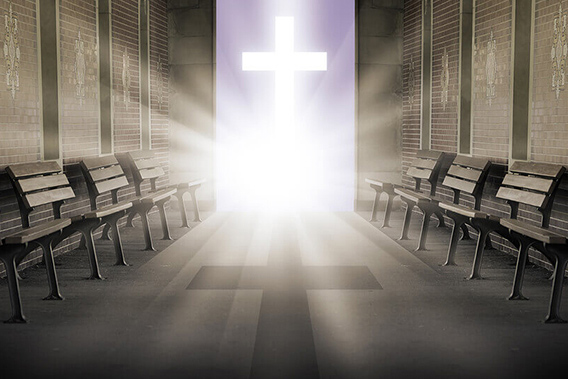“It is appointed unto man to die once, and after that the judgement.” Hebrews 9:27
As a witness to someone’s last breath you are in the presence of the most momentous events of their whole life – the threshold of eternity. My wife, sister, and I watched this past September as my father took his last breath on this earth, having breathed for nearly a century. It is truly tragic to see silence descend on someone so loved when you were just conversing with them moments before. This was Dad’s one appointment to die. You only get one, after all, unless you are Lazarus and the few other people raised to life by the Lord of life. Most of us die only once. The exceptions were Enoch and Elijah who were translated into eternity without traversing the valley of death, or going through the river which flows between us and heaven (think Pilgrim’s Progress). According to the Bible there will be those living when Jesus returns, who will not experience death either, but the vast majority of us will take a last breath.
I have witnessed a number of last breaths, having traversed lethal battlefields in Vietnam, kneeling by compatriots as they breathed their last, being by my mother’s and wife’s bedside at their death, as well as witnessing both my father’s and father-in-law’s last breath, among others. The reality of death encompasses you when you accompany your loved ones to the point of the last breath, but no farther. Everyone should have the experience of witnessing a final breath; meditate upon it both for the one who takes it, and for your own personal destiny, for you have an appointment as well “to die once, and after that the judgement.” Your meditation is vital to an understanding of the momentousness of life and death and your own mortality, and, in fact, your malleable-by-faith-destiny, for you have a critical decision to make while still breathing, but not after.
C.S. Lewis well said, “There are, aren’t there, only three things we can do about death: to desire it, to fear it, or to ignore it.” A few desire it, many fear it, far too many ignore it. The very worst thing you can do about the fact of death is ignore it. Is that where you are when you really think about it? Ignoring death is by far the easiest and most dangerous route in dealing, or not dealing with it, and its ramifications for you. It is actually tragic to the nth degree to ignore the truth of death; yet so many do. Your death ought to be the greatest incentive to the manner in which you live your life, even and especially if your actual moment of death is still half a century away, unbeknownst to you.
It is fairly certain that the thief on the cross beside Jesus, who was given assurance of salvation from the Lord’s own mouth in response to his expression of faith, regretted the years of unbelief preceding his last breath in crucifixion. But he had ignored death in the way he lived his life to breathing his last. But he received the same wages (of life) as the workers who came in the wee hours of the morning as told in the Lord’s parable, when he came in the last minute. If you are asking yourself in the moments of your last breath, “Is this all there is?” you are to be pitied above all men. Your destiny beyond death ought to govern your every thought in life as to how you think it, how you live it, and to whom the glory of your life belongs.
Lewis also said concerning death, “Die before you die. There is no chance after.” Now what in the world is he referring to? The Bible tells a person clearly if they try to find their life, or cling to it, they will actually lose it, but if they give up their life for me, the Lord of life, they will actually save their life, not only for this life, but for eternity. Lewis is saying, you need to die to self and live to God before you die, for there is no chance after. You die to self in this life, you die to pride; you die to self, you live for others; you die to self, you live for Christ. Jesus said he was the resurrection and the life. Some tend to see his statement as religious hocus-pocus; but such thinking is to their grievous loss. These are they who honestly have to ask themselves as they approach their last breath, “Is this all there is?”
The consideration of your certain death, incentivizes you to consider what happens after. Ignoring death is horrendously stupid, because it is not “all there is.” Even if you think so, what if it isn’t? You do not lose a thing by investigating the ramifications of your death, as long as you investigate sincerely to find the true answers. To not do so is the height of nonsense; it is an eternal mistake, and eternal is forever. No one truly knows the day of their final breath; but there really is a way to have certainty over what comes right after. Assurance of eternal life is the very best way to face your last breath, for there is really no fear of dying.
In fact, like the Apostle Paul, you will actually desire it, with the greatest feeling of joy. No paralyzing fear, no foolhardy ignoring, just the trusting assurance of whose hands you are in traversing the valley of the shadow of your death, and death itself. This is not a “pie-in-the-sky” trust. But a trust guaranteed by the ages of history, and by the millions of others who have found it solid-gold, and by those who have experienced the spiritual transformation of their life very emphatically. Final breath means being in the immediate presence of the Resurrected Savior. There is no greater anticipation and no greater joy reality when you do take that final breath.
“Chosen not for good in me, wakened up from wrath to flee, hidden in the Savior’s side, by the Spirit sanctified, teach me, Lord, on earth to show, by my love, how much I owe.”
(4th verse of Robert Murray McCheyne’s hymn, “Not Till Then How Much I Owe,” 1837)
Stay Updated
Sign up for our monthly newsletter and weekly devotional










